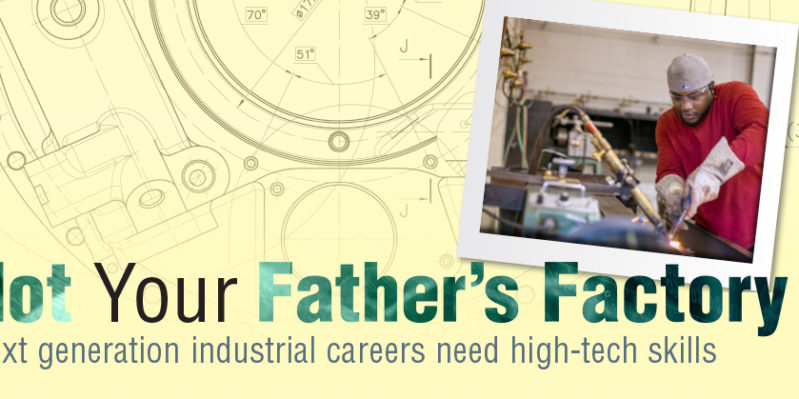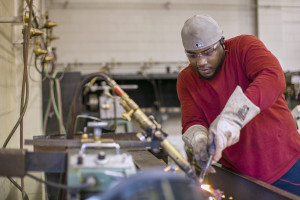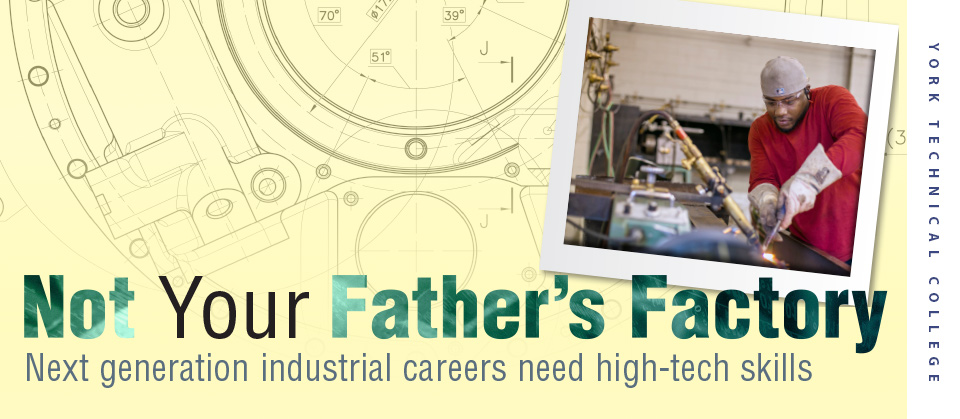
What do you think of when you imagine a shift change at a factory? Unless you work inside one, chances are you think of a messy shop floor, punch cards and time-clocks, and thousands of workers pouring in and out of the gates.
The textile mills that dominated our region’s economy for decades may still shape public perception of manufacturing. But within the industry, vast changes in technology and global trade have transformed the way products are designed and made.
We live in the era of Advanced Manufacturing, where workers with a high level of technical skills are needed to run and maintain complex machines, robots, and computer systems. A far cry from the old negative stereotypes of manufacturing, the new jobs are clean, steady, and offer good pay.
In fact, factory workers are some of the best paid workers in the country, according to AJ Jorgenson of the Manufacturing Institute, the Washington-based policy arm of the National Association of Manufacturers. “Today’s manufacturing employees earn higher wages and receive more generous benefits than other working Americans,” Jorgenson said.
He notes that for 2013, with average wages and benefits totaling $33.93 per hour, “there is almost a nine percent premium for working in manufacturing.”
Demand for skilled labor is skyrocketing. According to the US Labor Department, Advanced Manufacturing occupations grew by 99.4 percent between 2007 and 2012. And Economic Modeling Specialists International (EMSI) projects that the American manufacturing sector will add 2.5 million new jobs by 2017.
Local Industry is Growing
Locally, the SC Department of Employment and Workforce has identified Industrial Machinery Mechanics on its list of higher-wage jobs with good prospects and requiring less than a four-year degree. The average annual salary for these jobs in 2012 was nearly $48,000.
 In South Carolina, demand for new manufacturing workers continues to grow, following an increase of 18,000 jobs from 2010-2013. Last year, Singapore-based tire manufacturer Giti Tire announced plans to build its first North American plant in Chester County. The facility is expected to create around 1,700 new jobs over the next decade, with many of those positions requiring training in industrial maintenance or machine tool technology. York Technical College is working with state workforce-development groups and Giti Tire leadership to identify qualified candidates for these positions among students enrolled in the College’s Industrial and Engineering Technology programs.
In South Carolina, demand for new manufacturing workers continues to grow, following an increase of 18,000 jobs from 2010-2013. Last year, Singapore-based tire manufacturer Giti Tire announced plans to build its first North American plant in Chester County. The facility is expected to create around 1,700 new jobs over the next decade, with many of those positions requiring training in industrial maintenance or machine tool technology. York Technical College is working with state workforce-development groups and Giti Tire leadership to identify qualified candidates for these positions among students enrolled in the College’s Industrial and Engineering Technology programs.
In York County the Schaeffler Group, which develops and manufactures precision products for machines, equipment and vehicles as well as in aviation and aerospace, has announced plans to expand their production in Fort Mill. York Tech enjoys a close relationship with Schaeffler, which hosts YTC students in the Technical Scholars program.
Leaner, Smarter and More Productive
American manufacturing is leaner, and far more productive, than the factories of old. In fact, the Manufacturing Institute reports that in the two decades up to 2012, manufacturing output increased more than 83 percent. Manufacturing is also smarter today: the jobs are more technical and 80 percent require some training, according to a 2012 study by Georgetown University’s Public Policy Institute.
“Today’s manufacturing is about advanced technologies, state-of-the-art facilities, and fast-paced work environments,” states Jorgenson. “It’s where the ‘thought’ becomes the ‘thing’.”
With all of these jobs coming, the challenge for employers becomes how to find the skilled workers to fill them. It’s a great time for new high-school graduates and career changers alike to reconsider manufacturing. With job-ready programs and industry connections, York Technical College can be your ticket to a bright future and a rewarding career.
York Tech’s programs provide the skills you need
Industrial Maintenance Technology
Industrial operations depend heavily upon well-trained personnel to keep machinery and equipment in operating condition to support production. Employees involved in maintenance, repairs, and improvement of industrial operations must be well versed in such areas as safety, electricity, automation, Programmable Logic and Automation Controllers (PLCs and PACs), valves, pumps, welding, power transfer, pneumatics, hydraulics, and the use of hand and bench tools. They must also be capable of effective communications, interpretation of blueprints, and use of mathematics. Graduates are qualified for entry-level jobs in industrial maintenance because of the broad background offered by this curriculum.
Machine Tool Technology
The Machine Tool Technology curriculum prepares students for career opportunities in modern computer integrated manufacturing environments as machinist, tool and die makers, manufacturing process technicians, quality control technicians, CNC programmers, CNC setup and operation technicians. Students receive practical hands-on experience in machine tool labs using standard machine tool equipment and CNC equipment. This helps to train them to meet high quality standards in manufacturing intricate precision components in modern manufacturing environments. In addition, students also receive training in metallurgical heat treatment, blue print reading, GD&T (Geometrical Dimensioning and Tolerancing), CAD/CAM systems and precision measuring instruments.

